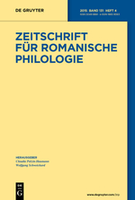
ZEITSCHRIFT FUR ROMANISCHE PHILOLOGIE
Scope & Guideline
Exploring the Rich Tapestry of Romance Languages and Literature
Introduction
Aims and Scopes
- Linguistic Analysis of Romance Languages:
The journal publishes research that delves into the phonetic, morphological, syntactic, and semantic aspects of Romance languages, exploring their evolution and variation over time. - Historical Linguistics and Philology:
A significant focus area is the historical development of Romance languages, including diachronic studies that analyze linguistic changes and their socio-cultural implications. - Literary Studies and Textual Analysis:
The journal features studies on literary texts from various Romance cultures, emphasizing critical editions, textual history, and the influence of historical context on literature. - Sociolinguistics and Language Contact:
Research on sociolinguistic phenomena, including language contact, multilingualism, and the impact of social factors on linguistic variation, is a key component of the journal's scope. - Cultural and Ideological Contexts:
Papers often explore the cultural and ideological implications of language use, examining how language reflects and shapes identity, power dynamics, and societal norms in Romance-speaking communities.
Trending and Emerging
- Interdisciplinary Approaches to Linguistics:
There is a growing trend towards interdisciplinary research that combines linguistics with fields such as anthropology, sociology, and cultural studies, reflecting the complexity of language in social contexts. - Language and Technology:
Emerging themes around the impact of technology on language use, including digital communication and language learning, are becoming increasingly prominent in recent publications. - Focus on Minoritized Languages and Dialects:
An increased interest in the study of minoritized languages and dialects within the Romance family highlights the journal's commitment to diversity and the exploration of underrepresented linguistic communities. - Language Change in Response to Global Events:
Research examining the effects of global events, such as the COVID-19 pandemic, on language use and evolution has gained traction, showcasing the journal's relevance to contemporary linguistic phenomena. - Cognitive and Psycholinguistic Perspectives:
There is a notable rise in studies that incorporate cognitive and psycholinguistic perspectives, exploring how language processing and comprehension are influenced by cognitive factors.
Declining or Waning
- Traditional Dialect Studies:
There has been a noticeable decrease in papers focused solely on traditional dialect studies, possibly due to the increasing interest in sociolinguistic dynamics and the impact of globalization on language. - Comprehensive Historical Surveys:
Research that provides broad historical overviews of Romance languages has become less frequent, as scholars are now more inclined to focus on specific case studies or emerging themes rather than general histories. - Static Language Descriptions:
Papers that offer static descriptions of language features without considering their dynamic nature or social contexts are becoming less common, indicating a shift toward more contextually grounded linguistic analysis.
Similar Journals

Carte Romanze
Exploring the Depths of Narrative and CultureCarte Romanze is a prominent academic journal published by Milano University Press, dedicated to the field of literature and cultural studies. With an ISSN of 2282-7447, it offers an invaluable platform for researchers, professionals, and students interested in exploring the rich landscapes of narrative and cultural expression. Since its transition to Open Access in 2013, the journal has championed the dissemination of knowledge, making high-quality research freely available to a global audience. Situated in the historic city of Milan, the journal aims to foster interdisciplinary dialogue and innovation in literary scholarship while maintaining rigorous academic standards. As it continues to contribute to the landscape of contemporary literature studies, Carte Romanze is poised to inspire new scholarly conversations and ideas.
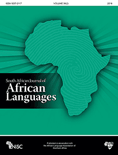
South African Journal of African Languages
Fostering innovative research in African linguistics and literary theory.The South African Journal of African Languages, published by Routledge Journals, Taylor & Francis Ltd, is a premier academic resource dedicated to the advancement of research in the fields of linguistics, language, and literary theory. Since its inception in 1996, this journal has been pivotal in fostering scholarly discourse around African languages, contributing significantly to our understanding of cultural and linguistic diversity across the continent. With its impressive categorization in 2023 as Q2 in Linguistics and Language and Q1 in Literature and Literary Theory, the journal attracts high-quality research and innovative perspectives, positioning itself among the leading publications in the relevant academic arenas. Researchers and students alike will find valuable insights within its pages, as it consistently ranks in the top percentiles of Scopus, notably achieving an 81st percentile in Literature and Literary Theory. The journal is committed to enhancing accessibility to research, although it currently does not offer Open Access options. Its scope includes an array of topics related to language policy, linguistic preservation, and literary critique, making it an essential resource for those engaged in the rich tapestry of African linguistics and literature.
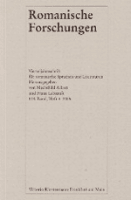
ROMANISCHE FORSCHUNGEN
Innovating Research in Romance LinguisticsROMANISCHE FORSCHUNGEN, published by VITTORIO KLOSTERMANN GMBH, stands as a key scholarly journal in the fields of linguistics and literary studies, focusing particularly on Romance languages and literature. With an ISSN of 0035-8126 and an E-ISSN of 1864-0737, this journal is vital for researchers and scholars seeking to explore and advance their understanding of the nuances within Romance language studies. Operating from its base in Frankfurt am Main, Germany, ROMANISCHE FORSCHUNGEN features a robust publication history from 2002 to 2024. While currently categorized in Q4 within both Linguistics and Language and Literature and Literary Theory for 2023, the journal aims to cultivate a scholarly dialogue that bridges these disciplines, fostering an environment for innovative and critical inquiry. Although not an open-access journal, it serves as a crucial resource for professionals and students dedicated to Romance philology and comparative literature.
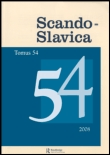
Scando-Slavica
Connecting Scholars: The Nexus of Scandinavia and Slavic StudiesScando-Slavica is a renowned academic journal published by ROUTLEDGE JOURNALS, TAYLOR & FRANCIS LTD, specializing in the rich interplay of Scandinavian and Slavic studies. With its ISSN 0080-6765 and E-ISSN 1600-082X, the journal has been a critical resource for scholars since its inception in 1954, covering a wide range of disciplines including archaeology, cultural studies, history, linguistics, and literature. As of 2023, it has consistently ranked in the third quartile across various categories, indicating its influential role in disseminating innovative research within the arts and humanities. With a focus on interdisciplinary dialogue, Scando-Slavica aims to foster a deeper understanding of cultural exchanges and linguistic connections, making it an essential read for researchers, professionals, and students interested in exploring the complexities of Nordic and Slavic interactions. While currently not an open access journal, its contributions have garnered substantial citations, bolstering its academic impact and relevance in a diverse scholarly landscape.
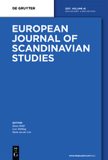
European Journal of Scandinavian Studies
Exploring the rich tapestry of Scandinavian cultures.European Journal of Scandinavian Studies is an esteemed journal published by Walter de Gruyter GmbH, dedicated to advancing scholarship in the fields of Cultural Studies, Linguistics and Language, and Literature and Literary Theory. Since its inception in 2010, the journal has been a pivotal platform for researchers and scholars, showcasing cutting-edge research and critical discussions pertaining to Scandinavian languages and cultures. With an ISSN of 2191-9399 and an E-ISSN of 2191-9402, the journal emphasizes accessibility to impactful academic work, despite its current non-open access model. While the journal is categorized within the Q4 quartile for Cultural Studies and Linguistics/Language, it has shown notable potential in ranking higher in its specialized domains, fostering a growing community of researchers invested in Scandinavian studies. The journal's office is located in Berlin, Germany, further enriching its European scholarly context. As it continues to evolve, the European Journal of Scandinavian Studies serves as a vital resource for academics seeking to engage deeply with the multifaceted aspects of Scandinavian culture and linguistics.

Revista de Filologia Alemana
Fostering Critical Insights in German StudiesRevista de Filologia Alemana, published by Universidad Complutense de Madrid, serves as a vital platform for scholarly dialogue in the fields of Linguistics and Literature. With its origins dating back to 1996, this peer-reviewed journal provides insights and critical analyses that foster a deeper understanding of German philology and its broader implications. Although categorized in Q4 across both Linguistics and Literary Theory as of 2023, the journal represents a growing contribution to academic discourse, aiming to enhance knowledge and promote research within these domains. Although it does not currently offer open access, the journal continues to attract submissions from both established scholars and emerging researchers, thereby ensuring a diverse range of perspectives. With Scopus rankings highlighting its position within the academic landscape, Revista de Filologia Alemana is essential for anyone looking to delve into the intricate relationships between language and literature.

Catalan Journal of Linguistics
Connecting Scholars through Open Access Linguistic Research.Catalan Journal of Linguistics is a distinguished academic publication dedicated to the dynamic field of linguistics and language studies. Published by the Universitat Autònoma de Barcelona, this open-access journal has been disseminating impactful research since 2002, making significant contributions to the understanding of linguistic theory, language acquisition, and sociolinguistics, particularly within the Catalan language context. With a robust engagement in the scholarly community, it proudly holds a Q2 ranking in Linguistics and Language as of 2023, reflecting its commitment to high standards of research and innovation. The journal is accessible to a global audience, promoting the free exchange of knowledge beyond geographical boundaries, and serves as an essential platform for researchers, professionals, and students aiming to stay at the forefront of linguistic inquiry. With its rich archive of articles, the Catalan Journal of Linguistics stands as a vital resource for anyone keen to explore contemporary linguistic issues and advancements.

Turkic Languages
Charting New Territories in Turkic LinguisticsTurkic Languages is an esteemed academic journal published by HARRASSOWITZ VERLAG, dedicated to the exploration and analysis of Turkic languages within the broader fields of linguistics and language studies. With an ISSN of 1431-4983, this journal serves as a vital platform for researchers, professionals, and students interested in the intricate structures, dynamics, and cultural contexts of Turkic languages. Although it currently operates without an Open Access option, the journal's commitment to quality research is evident in its placement within the Q4 category of Linguistics and Language for 2023, alongside its Scopus rankings where it stands in the 30th and 26th percentiles for Language and Linguistics across Arts and Humanities and Social Sciences, respectively. The journal's scope encompasses a variety of linguistic phenomena, striving to foster a deeper understanding of Turkic languages and their significance in the global linguistic landscape. With converged years from 2017 to 2022, Turkic Languages continues to uphold its reputation as a crucial resource for advancing scholarship in this specialized field.

Dialectologia
Connecting Scholars through Innovative Language StudiesDialectologia, published by the Universidad de Barcelona, Facultad de Filología, is a distinguished academic journal dedicated to the fields of linguistics and language studies. Since its inception in 2008, this Open Access journal has made significant strides in disseminating knowledge, fostering scholarly communication, and promoting research in dialectology and sociolinguistics. With its current classification in the Q3 quartile of linguistics and language, and Scopus rankings placing it in the 32nd and 29th percentiles within the Arts and Humanities and Social Sciences, respectively, Dialectologia plays a crucial role in advancing the study of language variation and change. The journal’s commitment to providing a platform for innovative research is underscored by its accessibility to a wide audience, ensuring that researchers, professionals, and students alike can engage with and contribute to contemporary discourse in language studies. Based in Barcelona, Spain, Dialectologia not only enriches academic literature but also connects a global community of language scholars through its compelling and diverse contributions.
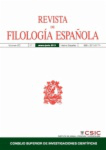
REVISTA DE FILOLOGIA ESPANOLA
Connecting Scholars Through Open Access ResearchREVISTA DE FILOLOGIA ESPANOLA is a distinguished academic journal dedicated to the fields of linguistics and literature, published by the CONSEJO SUPERIOR INVESTIGACIONES CIENTIFICAS (CSIC) since 1954, and has been an Open Access journal since its inception. Situated in Madrid, Spain, this journal has emerged as a crucial platform for the dissemination of scholarly research, with notable rankings including Q2 in Linguistics and Language and Q1 in Literature and Literary Theory as of 2023. The journal's commitment to fostering academic dialogue is reflected in its impressive Scopus rankings, including a 79th percentile in the Arts and Humanities for Literature and Literary Theory. Covering a wide range of topics from linguistic theory to literary critique, REVISTA DE FILOLOGIA ESPANOLA is essential reading for researchers, professionals, and students alike, providing valuable insights and cutting-edge research in the ever-evolving landscape of Spanish philology.